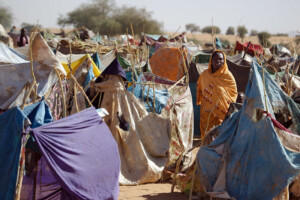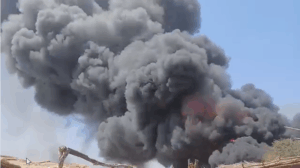Protester killed as forces violently crack down on Sudan protests
A young protester died after he was shot in the abdomen by security forces during yesterday’s Marches of the Millions, the Central Committee of Sudanese Doctors reported. Dozens of protesters were wounded in Khartoum North and other places during the demonstrations, which took place all over Sudan.
 El Rayeh Mohamed was shot dead by military forces in Khartoum during the January 13 Marches of the Millions (Social media)
El Rayeh Mohamed was shot dead by military forces in Khartoum during the January 13 Marches of the Millions (Social media)
A young protester died after he was shot in the abdomen by security forces during yesterday’s Marches of the Millions, the Central Committee of Sudanese Doctors reported. Dozens of protesters were wounded in Khartoum North and other places during the demonstrations, which took place all over Sudan.
The victim, El Rayeh Mohamed, was 21 when he died after he was shot in the abdomen. On social media, many people are paying tributes to the martyr and have shared the names and ages of the last protesters that have been shot by the military regime since the October 25 coup.
Mohamed is the 64th confirmed protester to have died at the hands of security forces during anti-coup protests. Other protesters who were killed recently were 17, 26, and 16 years of age.
The Central Committee of Sudanese Doctors reported that dozens of protesters were injured by live bullets, knife stabbings, and the firing of tear gas by security forces.
Video clips show that the military forces fired live bullets, machine gun shells, tear gas canisters, and stun grenades at the demonstrators.
Activists reported the injuries of dozens of demonstrators in Khartoum and Khartoum North.
The Khartoum North neighbourhood committees said in a statement that the authorities detained a number of demonstrators and beat and stabbed them with knives, before releasing them again.
El Jawda Hospital in El Deim in Khartoum received dozens of casualties after using excessive violence against the demonstrators. Dozens to hundreds of protesters have been injured during each of the Marches of the Millions since the coup as military forces routinely use excessive force to crack down on the protests.

an active and involved young man who did lots of voluntary support work
(Social media)
Police injuries?
The police press office announced that several policemen were injured during the demonstrations.
There has also been news about a police officer killed by protesters on January 13, but this has been denied on social media. Various social media users pointed to the fact that the news about the killing of Brig Ali Bereima came out days before the protests took place.
The Central Committee of Sudan Doctors said that the authorities, by means of their vast security apparatus, are trying to formulate a discourse around the alleged non-peacefulness of the protests against the military regime.
The doctors said in a statement yesterday that the attempts to intimidate the peaceful protests and Marches of the Millions with the use of violence “did not manage to harm the acumen of the demonstrators. The regime's violations are broader than it can conceal. Any justification for the crimes against humanity committed by the coup regime is pointless.”
'Any justification for the crimes against humanity committed by the coup regime is pointless' – Central Committee of Sudan Doctors

in Khartoum during yesterday's Marches of the Millions
(Social media: Sudan Resistance Committees Europe)
Yesterday’s demonstrations
The January 13 Marches of the Millions were called for by the resistance committees and the demonstrators demanded full civilian rule.
Tens of thousands of demonstrators marched from the neighbourhoods of Khartoum, Khartoum North, and Omdurman towards the Republican Palace yesterday, as the resistance committees had called for.
The Khartoum demonstrators were able to reach the vicinity of the Republican Palace before the vehicles of the joint forces surrounded them and were able to disperse them. Demonstrators observed heavy deployment of about 100 army vehicles in the vicinity of the palace.
The Khartoum North Neighbourhood Committees reported that security forces impeded the crossing of the demonstrators from the El Mak Nimir bridge to Khartoum by firing live ammunition, rubber bullets and tear gas canisters extensively.
In a statement, they reported chases inside neighbourhoods and a heavy police presence inside the markets.
The authorities also launched a detention campaign in the east Khartoum neighbourhoods of Dar El Salam, El Hoda, and in the vicinity of El Manshiya.
In the states, mass demonstrations took place in Wad Madani and El Managil in El Gezira, Kassala and El Gedaref in eastern Sudan, Zalingei and Nyala in Darfur, Ed Damazin in Blue Nile state, Kadugli in South Kordofan, Kosti in White Nile state, Sennar in Sennar, and Dongola in River Nile state.
Demonstrators in Wad Madani, capital of El Gezira, said that the march was subjected to excessively violent repression, including shooting, which caused several injuries.
The resistance committees of Kosti reported that the demonstrators were being chased inside the cemeteries and the Grand Mosque.
The Marches of the Millions had been postponed. In cities and towns like Port Sudan, El Fasher, Atbara, Ed Damer and Bara, protests took place on January 12, as originally scheduled.











 and then
and then